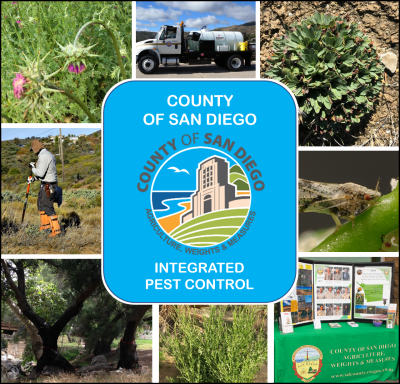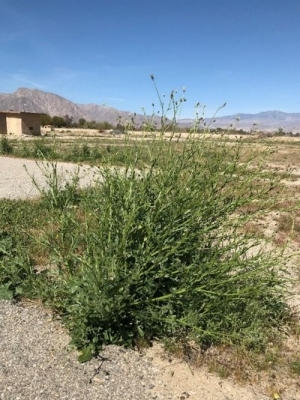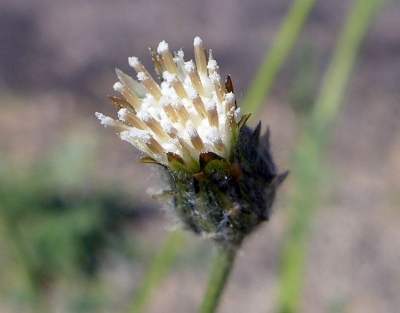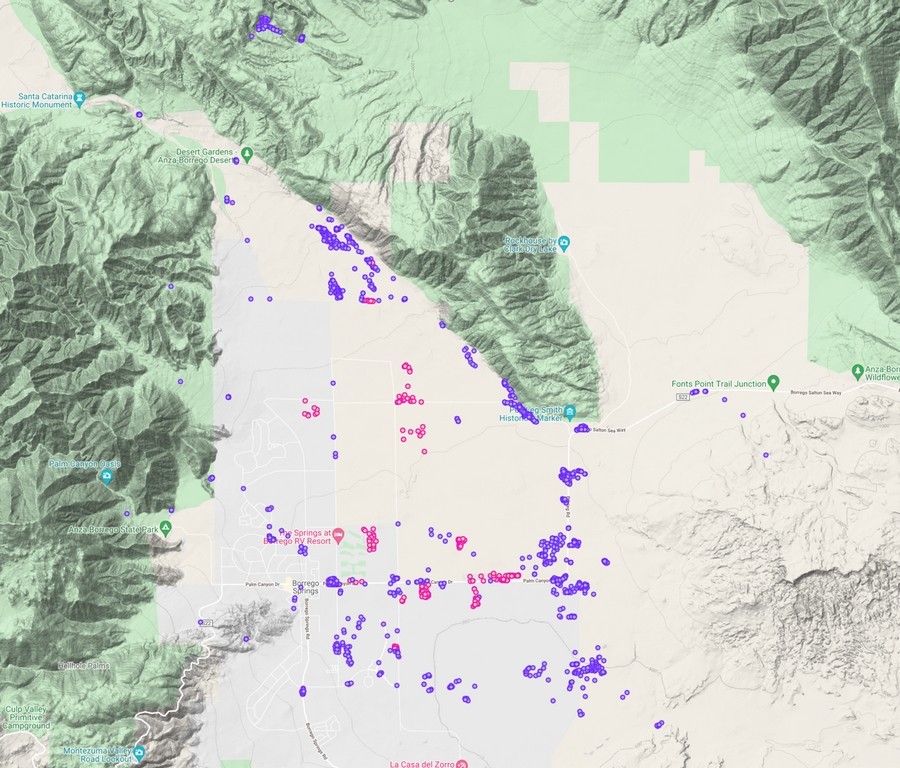Integrated Pest Control
About IPC
The Integrated Pest Control (IPC) Program, a division within the
County of San Diego Department of Agriculture, Weights & Measures,
performs several functions such as:
-
Weed control along County roads, County airports, and right-of-ways.
-
Invasive and exotic weed eradication on County and non-County property.
-
Structural pest control at County-owned facilities (We do not provide pest control services on private property).

IPC uses computerized chemical injection herbicide trucks that perform well in all of our weed control projects. Weed control along County roads and right-of-ways increases safety by preserving visibility and clearance, reducing fire danger along roadways and intersections, enhancing drainage to prevent flooding, and keeping safety pull-over areas visible and easy to use.
All IPC staff are state-certified pesticide applicators and are extensively trained in the Integrated Pest Management (IPM) principles of finding and using the least toxic methods for all pest control needs.
IPC News and Usage Data
IPC is committed to supporting a resilient environment and wildlife and promoting human health in our region. We always prefer safe and effective non-pesticide alternatives for pest management on County property, which is also a County of San Diego Board Policy. IPC uses Integrated Pest Management (IPM) practices, which is a way to treat pests with minimal pesticides. We conduct surveys and only use pesticides after we see that they are needed and use them only to treat the specific pest.
Below are quarterly topics and information on some of the pests found in the region and ways to treat them. You will also find highlights of how we control pests on County properties and weed management across the region.
Do you have any IPM practices that you want to share with the County? Email IPC.AWM@SDCounty.CA.gov and we will feature ideas in our upcoming quarterly topics!
FY 2024/2025 Quarter 1 | Quarter 2 | Quarter 3 | Quarter 4
FY 2023/2024 Quarter 1 | Quarter 2 | Quarter 3 | Quarter 4
FY 2022/2023 Quarter 1 | Quarter 2 | Quarter 3 | Quarter 4
Weed Control Agreement Form
Anyone requesting that herbicides not be used along their right-of-way to a County-maintained road must fill out a Weed Control Agreement form and assume responsibility for controlling vegetation to specified standards.
Contact Us/Report an Invasive Weed
County of San Diego
Agriculture, Weights &
Measures
Integrated Pest Control
Email: IPC.AWM@SDCounty.CA.gov
Report an Invasive Weed
When reporting a possible/known invasive plant species found within the county, fill out the Specimen for Determination form below and email it along with any pictures to IPC.AWM@SDCounty.CA.gov.
Note: Email file size must be no larger than 10MB. Please split files up into multiple emails if necessary.
Alternatively, you can also turn in the form and the plant sample to the County of San Diego Agriculture/Weights & Measures office located at 9325 Hazard Way, Suite 100, San Diego, CA 92123-1217. Within the form, please include your contact information so we may reach you for further clarification or to update you on any next steps.
Desert Knapweed: Volutaria Tubuliflora
Volutaria (Volutaria tubuliflora) is a highly invasive, noxious weed and A-rated pest by the California Department of Food and Agriculture (CDFA).
- A-rated pests: A pest of known economic or environmental detriment and is either not known to be established in California or is present in a limited distribution that allows for the possibility of eradication or successful containment.
- Noxious weeds: Any species of plant that is, or is liable to be, troublesome, aggressive, intrusive, detrimental, or destructive to agriculture, silviculture, or important native species, and difficult to control or eradicate
There are three known populations in North America, two of which are Borrego Springs and Chula Vista. Since 2016, AWM has worked to mitigate the spread of Volutaria by controlling it on roadsides, public property, and some private property; eradication or control efforts on private property require Right-of-Entry Authorization permits. While the Chula Vista site is small and well-controlled, Volutaria continues to spread in Borrego Springs.
The County of San Diego Department of Agriculture/Weights & Measures (AWM) has partnered with CDFA, California Invasive Plant Council, Department of National Parks, Borrego Springs Revitalization Committee, and several other agencies to aid in the eradication of this invasive weed. Currently, AWM’s priority is the development and systematic distribution of outreach to obtain Right-of-Entry Authorization permits from property owners with known infestations of Volutaria. The plant produces a moderate number of seeds that spread along roads, although large plants may produce thousands of seeds; eradication of this Noxious weed is unattainable unless we can locate and treat weeds prior to seeding and thus eliminate the seed bank.


If you believe Volutaria tubuliflora is located on your property (see CalFlora map), please help eradicate this invasive weed by filling out the Right-of-Entry Authorization form and emailing it to IPC.AWM@SDCounty.CA.gov.







